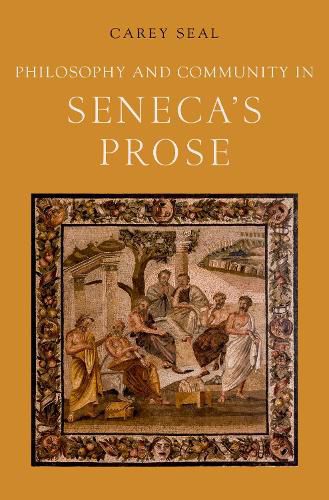Readings Newsletter
Become a Readings Member to make your shopping experience even easier.
Sign in or sign up for free!
You’re not far away from qualifying for FREE standard shipping within Australia
You’ve qualified for FREE standard shipping within Australia
The cart is loading…






The Roman philosopher Seneca addressed himself to the question of how we ought to live in letters and treatises that have engaged the attention of readers from his own day to the present. A committed, if critical and eccentric, adherent of Stoicism, he gives us a set of reflections on the good life that are rich both in philosophical subtlety and in vivid engagement with day-to-day life in ancient Rome. Philosophy and Community in Seneca’s Prose proposes a new understanding of the relationship between these two facets of Seneca’s achievement, examining how he balances the Socratic imperative to subject one’s life to rational scrutiny, on the one hand, with the claims of Roman moral tradition on the other.
Carey Seal argues that we should think of Seneca neither as a spokesman for Stoicism who seizes opportunistically upon the data of Roman social life to make his case, nor as an expositor of the inherited values of the Roman elite in the language of Stoic philosophy. Rather, Seneca should be understood as someone intensely interested in the question of philosophy’s social entanglements and presuppositions. Seneca’s use of Roman politics and of the institution of slavery in elaborating his ideal of a life guided by reason is carefully examined in the book.
$9.00 standard shipping within Australia
FREE standard shipping within Australia for orders over $100.00
Express & International shipping calculated at checkout
The Roman philosopher Seneca addressed himself to the question of how we ought to live in letters and treatises that have engaged the attention of readers from his own day to the present. A committed, if critical and eccentric, adherent of Stoicism, he gives us a set of reflections on the good life that are rich both in philosophical subtlety and in vivid engagement with day-to-day life in ancient Rome. Philosophy and Community in Seneca’s Prose proposes a new understanding of the relationship between these two facets of Seneca’s achievement, examining how he balances the Socratic imperative to subject one’s life to rational scrutiny, on the one hand, with the claims of Roman moral tradition on the other.
Carey Seal argues that we should think of Seneca neither as a spokesman for Stoicism who seizes opportunistically upon the data of Roman social life to make his case, nor as an expositor of the inherited values of the Roman elite in the language of Stoic philosophy. Rather, Seneca should be understood as someone intensely interested in the question of philosophy’s social entanglements and presuppositions. Seneca’s use of Roman politics and of the institution of slavery in elaborating his ideal of a life guided by reason is carefully examined in the book.